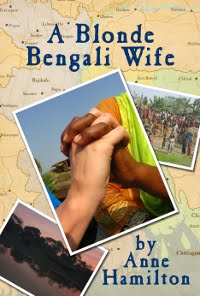They all said that Bangladesh would be an experience...
For Anne Hamilton, a three month winter programme of travel and “cultural exchange” in a country where the English language, fair hair and a rice allergy are all rare in the extreme was always going to be interesting, challenging and frustrating. What they didn’t tell Anne was that it would also be sunny, funny and the start of a love affair with this unexplored area of Southeast Asia.
A Blonde Bengali Wife shows the lives beyond the poverty, monsoons and diarrhoea of Bangladesh and charts a vibrant and fascinating place where one minute Anne is levelling a school playing field “fit for the national cricket team,” cobbling together a sparkly outfit for a formal wedding the next.
Along with Anne are the essential ingredients for survival: a travel-savvy Australian sidekick, a heaven-sent adopted family, and a short, dark, and handsome boy-next-door.
During her adventures zipping among the dusty clamour of the capital Dhaka, the longest sea beach in the world at Cox’s Bazaar, verdant Sylhet tea gardens, and the voluntary health projects of distant villages, Anne amasses a lot of friends, stories...and even a husband?
A Blonde Bengali Wife is the “unexpected travelogue” that reads like a comedy of manners to tell the other side of the story of Bangladesh.




